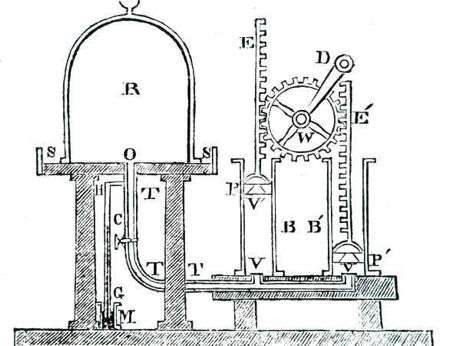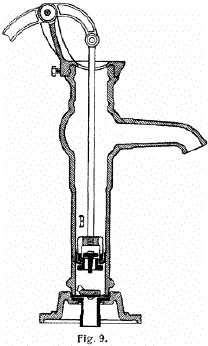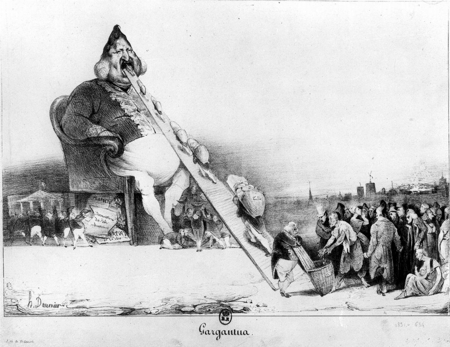Sunday - March 25, 2012
Molinari on the Suction Pump of "Ulcerous Government"


The State as "the suction pump" which sucks out taxes and debts from the Body Politic, thus causing ulcers to form.
[This is how it works: the State turns handle D which turns wheel W, which alternately raises and lowers suction valves E and E', which draws the citizens' taxes up through pipe G, thus filling vessel R, which can be used by the Ruling Class for whatever they want.]
I have translated the concluding pages of Molinari’s 2 volume treatise on political economy which he published in 1855 and revised in a second edition in 1863 while he was teaching and working in Belgium. He continued to develop and expand the ideas he first presented on this topic on “the production of security” and the “liberty of government” in the mid and late 1840s. As he says in a footnote, he is willing to claim priority in formulating these “fanciful” ideas.
The passage which caught my eye is this one:
Thus, by the very fact of their anti-economic constitution, governments have become the ulcers of societies (“les ulcères des sociétés”), to use the strong expression coined by J.B. Say. As population and wealth increase, thanks to the progressive development [531] of competitive industries, a growing mass of vital energy is sucked out of society by the suction pump which are taxes and debts, in order to subsidise the costs of production of public services, or to put it in a better way, to subsidise the support and easy enrichment of the particular class which controls the monopoly of the production of these services.
See the full translation of these pages here <http://davidmhart.com/FrenchClassicalLiberals/Molinari/Articles/UlcerousGovernment.html>.
Following Molinari's reference to Say I tried to find the source of Molinari's idea that the state is an ulcer on the body politic of society (or rather, body economic) but the passage from Say he cites has no reference to ulcers or any any disease. So it appears Molinari might the originator of this expression, although I recall that a similar use of the expression can be found in an article in the Dictionnaire de l'économie politique (1852) (I need to track this down!).
Source: Molinari, Cours d'économie politique, deuxième édition revue et augmentée, Tome II. La circulation et la consommation des richesses, (Paris: Guillaumin, 1863), pp. 528-34. Douzième leçon. "Les consommations publiques" (Pubic Consumption).
The quote continues:
As progress has given rise to the vital forces of society, what is the cure for this ulcer which devours them?
If, as I have tried to demonstrate, the problem comes from the anti-economic constitution of governments, the cure obviously consists in making this constitution conform to the essential principles which it does not understand, namely to make it economic. To achieve this it is necessary in the first instance to rid the governments of all those functions which have been annexed to their natural function of being producers of security, by making them return education, religion, the coining of money, transportation, etc., to the private sector, to the law of competition.
Already, the cause of the simplification of the functions of government has been won in theory [532] even if it has not been won in practice. On the other hand, the idea of subjecting governments to the regime of competition is still generally regarded as being fanciful. On this point perhaps the facts are advancing ahead of the theory. The “right of secession” has paved the way in the world and will have the necessary consequence of establishing the liberty of government. The day will come when this right will be recognised and applied throughout its natural range and political competition will serve as a complement to competition in agriculture, industry and commerce.
Whereas Molinari sees the state a a big suction pump draining wealth out of society, his contemporary Honoré Daumier views the state as a "tax eater" which consumed wealth by eating the taxes the citizens were forced to pay. Here is Daumier's “Gargantua” (1831) which is a thinly disguised depiction of King Louis Philippe:

See a larger version of this image [1400 px] and the illustrated essay I have written on this.
